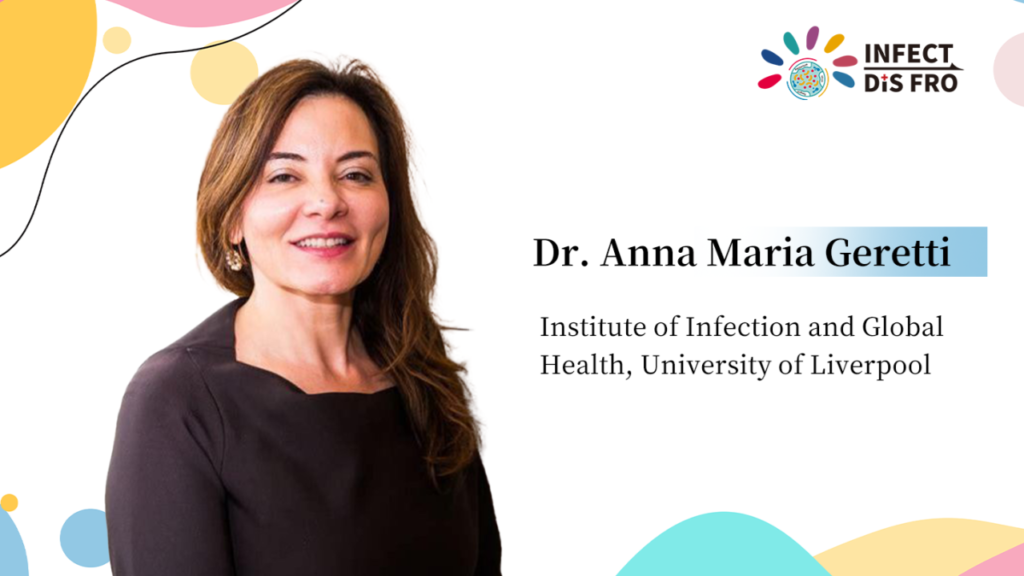
Editor's Note: In the field of AIDS prevention and treatment, tailored immunization strategies for HIV-positive individuals are becoming crucial for improving patients' quality of life and prolonging their lifespan. At the 25th International AIDS Conference (AIDS 2024), Dr. Anna Maria Geretti from the Institute of Infection and Global Health, University of Liverpool presented an insightful report on this topic and subsequently engaged in an extensive interview with " Infectious Disease Frontier"(IIDF). She emphasized the importance of ensuring that HIV-positive individuals receive appropriate vaccination recommendations and pointed out the deficiencies in comprehensiveness and personalization in current guidelines. Dr. Geretti elaborated on the key factors to consider when formulating personalized vaccination strategies, such as immune status, viral load, and CD4+ T-cell count, which directly influence vaccine selection and effectiveness. Furthermore, she shared the latest research findings and vaccination recommendations for vaccines against hepatitis B, shingles, pneumococcal disease, and human papillomavirus (HPV), providing a more scientific and comprehensive protection plan for HIV-positive individuals.01
IIDF: Professor Geretti, how specifically are the “tailored immunization strategies” mentioned in your presentation designed and implemented for HIV-infected adults?
Dr Geretti: I think we should start by saying that we make sure our patients living with HIV receive appropriate recommendations about vaccinations. It is really an important indicator of standards of care in HIV practice. That is the first recommendation we make – to review their needs and ensure appropriate vaccines are recommended, and also that patients are encouraged to uptake vaccines where they are indicated. So why do we produce specific guidance for people living with HIV? It is because we know that often we need to be very proactive in making such recommendations so our patients are not forgotten. Also, because when we see guidance about vaccinating the general population, often people living with HIV are not mentioned or mentioned very briefly. There really isn’t a very clear view about what is needed, why it is needed, and if needed, why is it important? We aim to fill that gap to make sure there is clear guidance. Now there is a need to also be very specific, because we still see some gaps in responses in people living with HIV relative to people who don’t have HIV. So we see this gap in responses, which means we have to tailor strategies. We essentially need to think about which vaccine, perhaps also which type of vaccine for a specific indication, the number of doses, the appropriate intervals between doses, and perhaps think about whether we need to monitor responses and recommend more than a vaccine course alone. So there are a number of reasons why we need tailored indications.
02
IIDF: When devising these tailored strategies, what key factors did you consider, such as the immune status, viral load, and CD4+ T-cell count of HIV-infected individuals? How do these factors influence the selection and effectiveness of vaccination?
Dr Geretti: What we see is that effective antiretroviral therapy (ART) has obviously had tremendous success in ensuring appropriate treatment and essentially a good quality of life, and also prolonged life, for our patients. In fact, these are the factors that make vaccination as an effective protection against other infections even more important. But there is no doubt that HIV infection, despite the success of ART, continues to have an impact on responses to vaccination, so indeed, we need to consider factors, such as the CD4 count. We, for example, continue to recommend against the use of live vaccines or vaccines that replicate in the host. If in individuals with HIV, you have a CD4 count below 200, we would generally recommend for these particular types of vaccines (measles, mumps, rubella, chicken pox (varicella), sometimes yellow fever) that a risk-benefit assessment is done, and individuals who have immunodeficiency wait before getting the vaccine until their CD4 count has improved. For other vaccines, we are not so much concerned with safety if the vaccine is non-replicative. We are not concerned about safety because the data are generally very reassuring about the safety of the vaccines we have available. What we do consider though is the impact that CD4 count due to viremia can have on responses to these vaccines. We make recommendations about, for instance: considering whether we need to increase the number of doses; whether we need to wait perhaps until the CD4 count has improved before we either start or compete the vaccination; whether we may want to use additional doses of the vaccine in people who receive a vaccination when the CD4 count is still low, perhaps still with viremia. So these are all considerations we make.
03
IIDF: What vaccines do you consider to be most effective in providing protection for HIV-infected individuals? What insights do these successful cases provide for us?
Dr Geretti: Our Symposium today at this AIDS conference focused on four major vaccines. We discussed the hepatitis B vaccination. We discussed shingles, the herpes zoster vaccine. The pneumococcus vaccination. And also the HPV (human papillomavirus) vaccination. These are all very important vaccines for individuals living with HIV. We didn’t, obviously, cover all of the vaccines that could be considered important. There are others that are very important. They are important to protect our patients with HIV against influenza every year. We recommend the parenteral influenza vaccine be given every year. Also, we need to think about hepatitis A protection. We continue to see, for instance, outbreaks. I practice in Europe, and we continue to see outbreaks of hepatitis A, particularly among MSM (men who have sex with men), with recent outbreaks in several parts of the European region. It is important to protect patients at risk against hepatitis A. We also recommend looking at the need for the meningococcus vaccination. The list is very exhaustive. I would also like to say that we need to make sure we support our patients living with HIV in fulfilling their wishes about their life and their occupations. We want to be supportive. If they wish to travel, we want to have recommendations for travel vaccines – how to vaccinate against typhoid, or considerations to be made about yellow fever vaccination, or tick-borne encephalitis, and so forth. At the British HIV Association, we really strive to ensure that we are comprehensive in listing vaccines that are essential for health, and also vaccines that are important to ensure that individuals are able to fulfill their aspirations in life and occupation.
04
IIDF: Professor Geretti, what are the key changes or updates in the newly revised BHIVA Guidelines on Immunisations for Adults Living with HIV compared to the previous version? What new scientific evidence or clinical practices have informed these changes?
Dr Geretti: There are several. Today, we discussed, for instance, the new recommendations about shingles or herpes zoster, because relative to the previous version, we now have the recombinant zoster vaccine, which is more effective than the previous attenuated live vaccine. The recombinant vaccine is not only more effective, but also safer for our patients living with HIV, because there is no restriction in relation to the CD4 count. That is a very important element. We have also updated the hepatitis B guidelines, in particular to consider newer vaccines that have recently become available, and we have made recommendations around those. We have also updated the pneumococcus guidelines, particularly to account for the recent introduction, at least in our setting, of the PCV20, the high valency conjugated vaccine. There are other changes. I would say that probably there is some strengthening of the recommendations around human papillomavirus. That is something to draw attention to. We have also updated other sections of the guidelines in relation to the travel vaccines, as I mentioned. Probably the ones we discussed today around shingles, pneumococcus, hepatitis B, and also to some extent, the human papillomavirus, are the key updates.
05
IIDF: How does the new guideline balance the safety and effectiveness of vaccinations in the context of potential immune response differences among HIV-infected individuals? Are there any new recommendations regarding vaccine dosage adjustments or intervals between vaccinations?
Dr Geretti: We essentially have kept to the same approach because the data continue to indicate that HIV per se can reduce the immunogenicity of vaccines. This doesn’t apply to everybody to the same extent, but obviously, we need to issue guidance that is applicable to the larger population. In general terms, we see that there is some reduction in immunogenicity. The responses, for instance, antibody titers, might be lower compared to people without HIV, and also they might last for a shorter time. We take into consideration these elements – CD4 count, viremia, also the nadir CD4 count – but then take a broad approach and make recommendations that can be applicable to the vast majority of people living with HIV.


